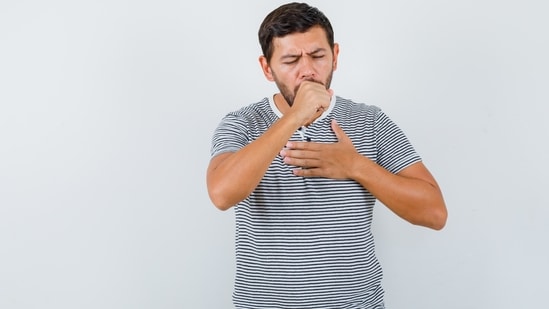Changing seasons can invite a range of infections and illnesses. But for some, it also brings an uninvited challenge – difficulty in breathing. In an interview with HT Lifestyle, Dr Kuldeep Kumar Grover, critical care and pulmonology head, CK Birla Hospital, Gurugram said, “Temperature, humidity, and air quality changes that occur when seasons change can make the airways swell, making it more difficult for lungs to work properly.”
 Season change can make breathing difficult.(Shutterstock)
Season change can make breathing difficult.(Shutterstock)
Dr Kuldeep Kumar Grover further explained how changing weather patterns can affect your respiratory system. Also read | Pulmonologist shares how breathlessness could indicate life-threatening lung or heart problems; when to seek help
1. Sudden temperature fluctuations can narrow airways
Moving from warm to cold air or vice versa can cause your airways to tighten, making breathing difficult. This is particularly challenging for people with asthma or chronic obstructive pulmonary disease (COPD), as their lungs are more sensitive to rapid temperature shifts.
2. Increase in airborne allergens
Spring and autumn tend to be seasons when more pollen, mold spores, and other allergens are in the air. Inhalation of these particles can irritate the airways, causing cough, wheeze, and breathlessness in individuals with allergic asthma or hay fever.
 Having breathing difficulty? Here are a few tips to manage it.(Image by 8photo on Freepik) 3. Dry winter air irritates the lungs
Having breathing difficulty? Here are a few tips to manage it.(Image by 8photo on Freepik) 3. Dry winter air irritates the lungs
Cold winter air is drier, and this drying effect can remove moisture from your breathing passages. This dryness causes irritation, brings on asthma symptoms, and predisposes the lungs to infection.
4. Increase in air pollution levels
Seasonal variations in weather may change the patterns of air circulation, entrap pollutants near ground level. Winter inversion layers, for instance, may cause days with poor air quality, which aggravate respiratory diseases and lower lung function, particularly in cities.
5. Risk of respiratory infections
Unstable temperatures and close indoor contacts in colder seasons boost the transmission of viruses such as influenza and respiratory syncytial virus (RSV). They can lead to congestion, excess mucus secretion, and exacerbation of underlying lung diseases. Also read | Wheezing no more! 4 simple physio tricks every parent should know for kids with asthma
Tips to manage breathing difficulties:
“If you find that your breathing deteriorates during the changing seasons, it’s wise to take preventive measures. Wearing a scarf over your mouth during winter, operating air purifiers during pollen season, staying well-hydrated, and receiving recommended vaccinations can help go a long way towards safeguarding your lungs,” the pulmonologist added.
Note to readers: This article is for informational purposes only and not a substitute for professional medical advice. Always seek the advice of your doctor with any questions about a medical condition.

